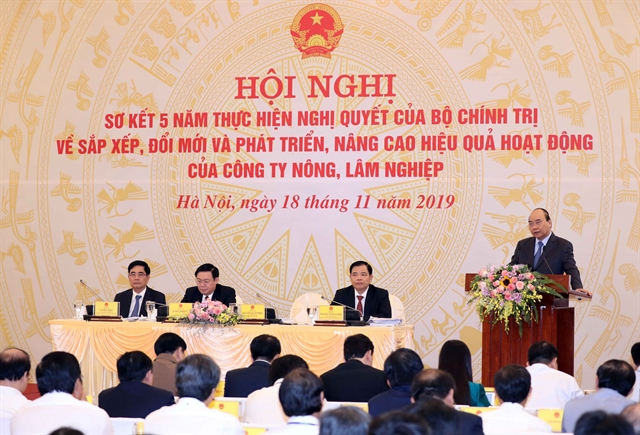 Politics & Law
Politics & Law

.jpg)
|
| Residents in the central province of Bình Định's Vân Canh District harvest timber from the hybrid acacia forest. Prime Minister Nguyễn Xuân Phúc has highlighted the need to ensure the livelihoods of local residents, especially ethnic minorities, during the restructuring of agro-forestry companies. — VNA/VNS Photo Phạm Kha |
HÀ NỘI — Prime Minister Nguyễn Xuân Phúc has highlighted the need to fine-tune laws and policies, effectively manage land, forests and human resources and focus on job creation to ensure the livelihoods of local residents, especially ethnic minorities, during the restructuring of agro-forestry companies.
Phúc was speaking at a conference in Hà Nội on Monday to review the five-year implementation of the Politburo’s Resolution No30-NQ/TW from March 2014, and Government Decree No118/2014/NĐ-CP from December the same year regarding the renewal and development of agricultural and forestry companies.
The PM highlighted that Việt Nam used to have 9 million hectares of agricultural and forestry farms, but now had only 1.8 million hectares.
“So what have these 1.8 million hectares contributed to national success, to people's livelihoods and the development of Việt Nam's agricultural sector?" asked the PM.

|
| Prime Minister Nguyễn Xuân Phúc speaks at a conference in Hà Nội on Monday to review the five-year implementation of a plan to develop and improve the operational efficiency of agricultural and forestry companies. — VNA/VNS Photo Thống Nhất |
"How can agriculture and forestry lead Việt Nam's agriculture sector?" he continued.
Highlighting the effective use of agricultural and forestry land, Phúc asked relevant agencies to complete a report and draft resolution to submit to the Politburo with solutions to remove difficulties in order to develop the sector more effectively and improve people's lives.
The PM noted initial results of the reorganisation of agro-forestry companies and praised some profitable models.
However, he pointed out shortcomings regarding land use that violated the interests of businesses, individuals and organisations.
He urged companies that had been restructured to continue searching for investment, and promote the early formation of agro-forestry production areas, large-scale concentrated commodity production, intensive farming, and the application of technology.
The PM also requested companies to focus on innovation and development to improve efficiency under Resolution 30.
The Government leader also directed the Committee for the Management of State Capital to thoroughly review the restructuring of coffee, rubber and forestry corporations, which controlled a vast area of land.
A report from the Ministry of Agriculture and Rural Development released at the conference showed that the restructuring of agro-forestry companies had created jobs for workers in border, remote and ethnic minority regions, contributing to socio-political stability and new rural development.
Speaking at the event, Deputy Prime Minister Vương Đình Huệ, who is also head of the Central Steering Committee for Business Innovation and Development, said 160 out of the 256 agro-forestry companies had shifted to the new model as of June 30, adding that the Government would strive to basically complete the task by 2020.
A number of agro-forestry companies have adopted the equitisation model and attracted investors with sound financial capacity, sci-tech expertise and governance skills, he said.
According to the report, before restructuring, equity in agro-forestry companies stood at VNĐ24.8 trillion (an average of VNĐ96.89 billion per company) with total revenue of VNĐ21.98 trillion (VNĐ85.85 billion per company) and after tax profit of VNĐ3.52 trillion.
After restructuring, equity had increased to VNĐ27.84 trillion (VNĐ127.1 billion per company), but total revenue had decreased to VNĐ14.97 trillion (VNĐ68.35 billion per company) with after tax profit of just VNĐ2.27 trillion. — VNS




